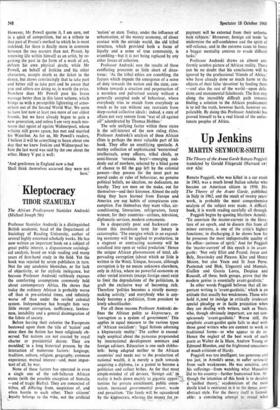Kleptocracy
TIBOR SZAMUELY
The African Predicament Stanislav Andreski (Michael Joseph 50s) Professor Stanislav Andreski is a distinguished British academic, head of the Department of Sociology of Reading University, author of several highly esteemed scholarly works. He has now written an important book on a subject of great public interest, a dispassionate sociologi- cal analysis, based on wide reading and many years of first-hand study in the field. Yet the book was rejected by seven publishers in turn. Not for any academic blemishes, or for lack of objectivity, or for stylistic inelegance, but because Professor Andreski ruthlessly exposes the comforting assumptions commonly held about contemporary Africa. He shows that today the ordinary African is probably worse off than in pre-colonial times, and infinitely worse off than under the reviled colonial system. Independence has brought him very little except corruption, inefficiency, lawless- ness, instability and a general disintegration of the fabric of society.
Before leaving their colonies the Europeans bestowed upon them the title of 'nation' and since then the fiction has been religiously ob- served. Yet nations are not created by royal charter or presidential decree. They are moulded,' in a long historical process, by the interaction of numerous factors: language, tradition, culture, religion, geography, common. experience, mutual interest—and, most impor- tant of all, by war.
None of these factors has operated in even a single one of the sub-Saharan African states (with the possible exception of Somalia —and of tragic Biafra). They are concocted of tribes, all differing from, suspicious of, and often hostile to each other. Their citizens' loyalty belongs to the tribe, not the artificial 'nation' or state. Today, under the influence of urbanisation, of the money economy, of closer contact with the outside world, the old tribal structure, which provided both a focus of loyalty and a sense of true community, is crumbling—but it is not being replaced by any other forces of cohesion.
Professor Andreski sees the results of these conflicting processes as little short of disas- trous : 'As the tribal ethics are crumbling, the factors which impede ihe emergence of a sense of duty towards the nation and the state, con- tribute towards a creation and perpetuation of a normless and pulverised society without a generally accepted code of behaviour, where everybody tries to snatch from everybody as much as he can without any restraints from deep-rooted collective ideals : indeed, a state of affairs not very remote from "war of all against all" adumbrated by Thomas Hobbes.'
The sole unifying factor within these states is the self-interest of the new ruling &Res.
Professor Andreski's analysis of these African elites is perhaps the most valuable part of his book. They offer an unedifying spectacle. A motley collection of sophisticated 'westernised' intellectuals, army officers, tribal chiefs, or semi-literate 'veranda boys'—emerging sud- denly out of nowhere, selected by a blind game of chance to fill the gap left by the colonial powers—they possess for the most part no moral codes or rules of behaviour, no genuine political beliefs, no idealism, no dedication, no loyalty. They are men on the make, out for themselves—and their kinsmen. Almost the only thing they have learned from Europe and America are our habits of conspicuous con- sumption. For themselves they want villas, air- conditioning, limousines, refrigerators, fancy women; for their countries—airlines, television, diplomatic services, modern armaments.
In a desperately poor and backward con- tinent this inordinate taste for luxury is catastrophic. 'The energies which in an expand- ing economy will be applied to production, in a stagnant or contracting economy will be canalised into open or veiled predation.' Hence the unique African phenomenon of total, all- pervading corruption (about which so little is written in the West). Unique, because, although corruption is by no means unknown elsewhere, only in Africa, where no powerful economic or other vested interests (except foreign ones) exist to limit the depredations of the politicians, is graft the exclusive way of becoming rich.
Therefore 'politics becomes a strictly money- making activity,' and everybody who is any- body becomes a politician, from president to lowly schoolteacher.
For all these reasons Professor Andreski de- fines the African polity as kleptocracy, or 'corruption as a system of government.' This applies in equal measure to the various types of 'African socialism': 'legal fictions adorning a kleptocratic reality.' The author is exceed- ingly sceptical about the panaceas propounded by international development seminars and foreign advisers. Education is one such shibbo- leth: being adapted neither to the African countries' real needs nor to the production of national wealth, it is merely a path towards acquiring a diploma, i.e. a patent to become a politician and collect bribes. As for that most simple-minded of all devices, 'foreign aid,' in reality it boils down mainly to gigantic oppor tunities fqr private enrichment, public osten- tation, increased governmental power, waste and parasitism. 'The funds will .be squandered by the kleptocrats, whereas .the mqper,for re- payment will be extorted from their unfortu- nate subjects.' Moreover, foreign aid tends `to Undermine the self-confidence and the spirit of self-reliance, and in the extreme cases to foster a beggar mentality anxious to evade difficult tasks.'
Professor Andreski draws an almost uni- formly sombre picture of African reality. There can be no doubt that his conclusions will be ignored by the professional 'friends of Africa,' who have already done so much harm to the objects of their false 'devotion' by feeding them —and also the rest of the world—upon delu- sions and monumental falsehoods. The first step along the incredibly difficult path towards finding a solution to the African predicament is to tell the truth, however harsh, however un- palatable. By doing this Professor Andreski has proved himself to be a real friend of the unfor- tunate peoples of Africa.






































 Previous page
Previous page